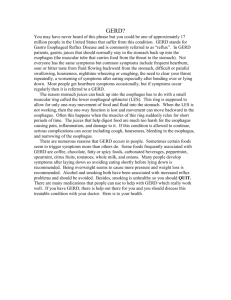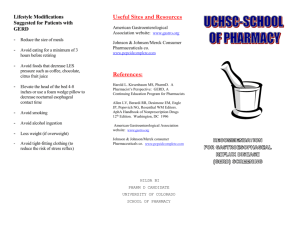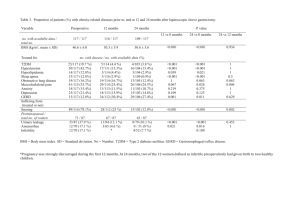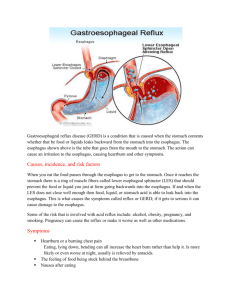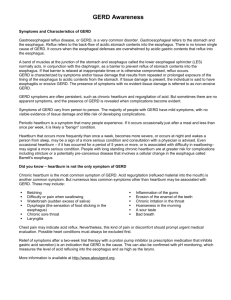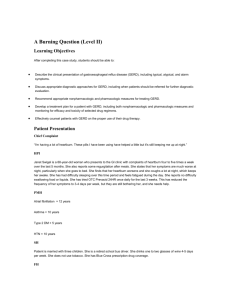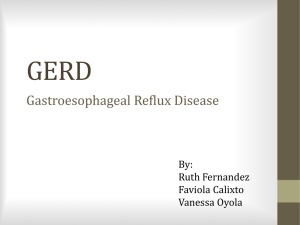File - Roxanne Rickert
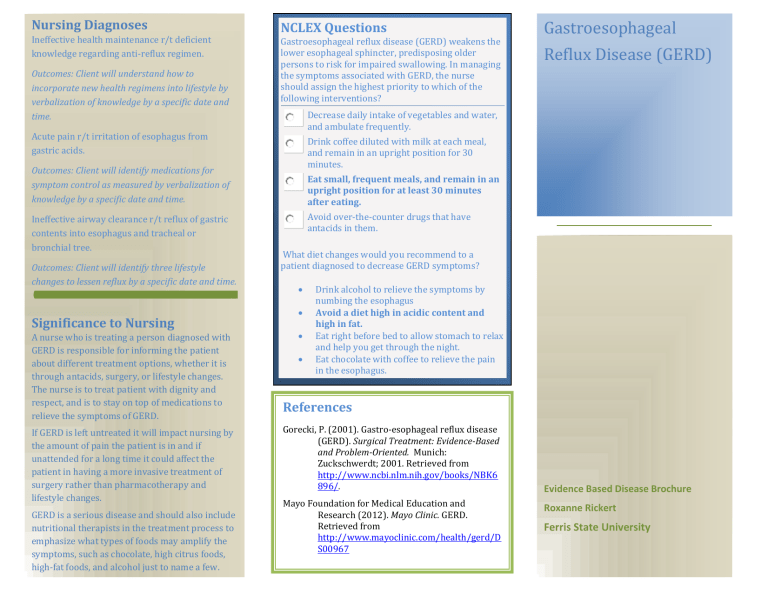
Nursing Diagnoses
Ineffective health maintenance r/t deficient knowledge regarding anti-reflux regimen.
Outcomes: Client will understand how to incorporate new health regimens into lifestyle by verbalization of knowledge by a specific date and time.
Acute pain r/t irritation of esophagus from gastric acids.
Outcomes: Client will identify medications for symptom control as measured by verbalization of knowledge by a specific date and time.
Ineffective airway clearance r/t reflux of gastric contents into esophagus and tracheal or bronchial tree.
Outcomes: Client will identify three lifestyle changes to lessen reflux by a specific date and time.
Significance to Nursing
A nurse who is treating a person diagnosed with
GERD is responsible for informing the patient about different treatment options, whether it is through antacids, surgery, or lifestyle changes.
The nurse is to treat patient with dignity and respect, and is to stay on top of medications to relieve the symptoms of GERD.
If GERD is left untreated it will impact nursing by the amount of pain the patient is in and if unattended for a long time it could affect the patient in having a more invasive treatment of surgery rather than pharmacotherapy and lifestyle changes.
GERD is a serious disease and should also include nutritional therapists in the treatment process to emphasize what types of foods may amplify the symptoms, such as chocolate, high citrus foods, high-fat foods, and alcohol just to name a few.
NCLEX Questions
Gastroesophageal reflux disease (GERD) weakens the lower esophageal sphincter, predisposing older persons to risk for impaired swallowing. In managing the symptoms associated with GERD, the nurse should assign the highest priority to which of the following interventions?
Decrease daily intake of vegetables and water, and ambulate frequently.
Drink coffee diluted with milk at each meal, and remain in an upright position for 30 minutes.
Eat small, frequent meals, and remain in an upright position for at least 30 minutes after eating.
Avoid over-the-counter drugs that have antacids in them.
What diet changes would you recommend to a patient diagnosed to decrease GERD symptoms?
Drink alcohol to relieve the symptoms by numbing the esophagus
Avoid a diet high in acidic content and high in fat.
Eat right before bed to allow stomach to relax and help you get through the night.
Eat chocolate with coffee to relieve the pain in the esophagus.
References
Gorecki, P. (2001). Gastro-esophageal reflux disease
(GERD). Surgical Treatment: Evidence-Based
and Problem-Oriented. Munich:
Zuckschwerdt; 2001. Retrieved from http://www.ncbi.nlm.nih.gov/books/NBK6
896/ .
Mayo Foundation for Medical Education and
Research (2012). Mayo Clinic. GERD.
Retrieved from http://www.mayoclinic.com/health/gerd/D
S00967
Gastroesophageal
Reflux Disease (GERD)
Evidence Based Disease Brochure
Roxanne Rickert
Ferris State University
Explanation of GERD
Almost everyone has experienced heartburn; about 25 million Americans suffer daily from heartburn. Occasional heartburn is not overly worrisome, its serious heartburn occurring twice in a week or when it interferes with daily life that it becomes an issue and is known as GERD.
GERD is a chronic disease of the digestive system, in particular the esophagus and the stomachs meeting point, the lower esophageal sphincter (LES). The LES’s function is to remain tightly closed except to allow food and drinks to drop into the stomach. GERD is the continual dysfunction of the LES (relaxation at the wrong time) which allows backflow of stomach acid into the esophagus (reflux) causing irritation and inflammation to its lining, causing
GERD signs and symptoms.
Some risk factors associated with GERD include obesity and pregnancy, because of the extra pressure on the LES. Some other common factors leading to increased incidence of GERD include hiatal hernias, asthma, dry mouth, diabetes, delayed stomach emptying, and smoking. All of these factors hinder the function of the LES in one way or another whether it is through pressure or making the elasticity of the LES be relaxed and allow backflow into the esophagus.
Clinical Manifestations and Potential
Complications
The most common symptom is frequent heartburn, but some may also experience a bitter or sour taste coming up into the mouth especially during sleep, some may experience hoarseness, or feel the excessive need to clear the throat.
Difficulty swallowing food or liquids, and worsening of symptoms after eating or when bending over or lying down are also common symptoms. All of these symptoms have to do with the stomach juices back flowing into the esophagus and causing irritation to the lining.
Some complications that arise from the continual acid coming in contact with the lining of the esophagus can include irritation, inflammation, ulcers and bleeding due to the acidity which the esophagus lining is not made to withstand like the stomach lining is. These complications occur when GERD is severe or long-standing. Over time scarring and narrowing of the esophagus can develop (also known as a stricture) making swallowing difficult and choking then becomes a concern. Another complication from prolonged
GERD is Barrett’s esophagus which is the drastic change of the cells, lining of the esophagus.
Life Span and Cultural
Considerations
Infants can be born with GERD but usually grow out of it after their first birthday.
Signs and symptoms generally include frequent vomiting episodes as well difficulty feeding and weight loss. Infants
GERD is usually caused by the poor coordination of the gastrointestinal tract.
Children can also have GERD which is often the same as adults GERD with signs and symptoms. Increasing heartburn episodes can consist of eating spicy or acidic foods along with alcohol.
Pregnancy can also lead to situational GERD because of the added pressure on the stomach leading to more pressure on the
LES and an increased likely hood of the gastric contents to enter the esophagus and thus irritating the linings.
There has also been links to inheriting
GERD.
Caucasians and Hispanics have high occurrence rates of GERD while Asian’s have lower incidences. Some considerations that nurses need to be aware of include a person’s belief on their health, which can affect a person’s desire to get help. Beliefs about self-treatment, modesty, embarrassment, and fear of illness all can affect a person’s desire to get help in relation to GERD.
